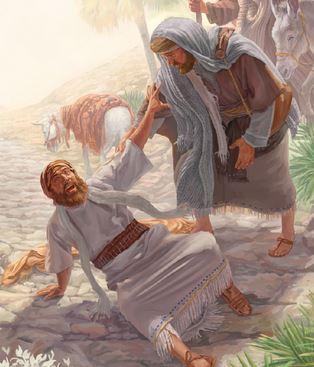Saulus

Biblical Figure / Apostle / Missionary / Theological Architect of Early Christianity
📖 Overview:
Saul of Tarsus, later known as Paul, was first a fierce persecutor of early Christians, but after a profound spiritual experience, he became one of Christianity’s most influential apostles and theologians. He authored many of the letters (epistles) in the New Testament, helping to shape Christian theology and spread the message of Jesus throughout the Roman world.
🧾 Name and Background:
-
"Saul" (Hebrew: Sha'ul) – a common Jewish name (also the name of Israel’s first king)
-
"Paul" (Latin: Paulus) – meaning “small” or “humble”
-
Born in Tarsus (modern-day Turkey), a city of culture and learning
-
A Roman citizen and a Pharisee trained in Jewish law
-
Fluent in Greek and familiar with Hellenistic culture
⚔️ Saul the Persecutor:
-
Mentioned in the Acts of the Apostles as an opponent of the early Christian movement
-
Present at the stoning of Stephen, the first Christian martyr
-
Actively sought to arrest and suppress Christians on behalf of the Jewish authorities
⚡ Conversion (The Damascus Road Experience):
-
On his way to Damascus, Saul experienced a vision of the risen Christ
-
Heard the voice: “Saul, Saul, why do you persecute me?”
-
Temporarily blinded, he was later healed by Ananias, a Christian in Damascus
-
After this event, he was baptized, adopted the name Paul, and began preaching the faith he once tried to destroy
👉 This dramatic change is often referred to as a “Damascus moment” or a “Saul-to-Paul transformation” — meaning a radical personal or spiritual turnaround.
✉️ Work as Apostle and Theologian:
-
Traveled extensively across the Roman Empire to spread the Christian message
-
Founded numerous churches in Asia Minor, Greece, and Rome
-
Wrote many of the Epistles in the New Testament (Romans, Corinthians, Galatians, etc.)
-
Central theological themes:
-
Salvation by grace through faith
-
Justification without the law
-
The universality of Christ’s message
-
Unity of Jews and Gentiles in the body of Christ
-
⛓️ Persecution and Death:
-
Frequently imprisoned, beaten, and persecuted, but remained committed to his mission
-
Wrote several letters from prison
-
According to tradition, Paul was executed in Rome, likely by beheading under Emperor Nero (around 64 CE)
📜 Significance in Christianity:
-
Considered the most important figure in the development of early Christian theology
-
Helped transform Christianity from a Jewish sect into a global faith
-
His writings remain foundational for:
-
Christian doctrine
-
Ethics and moral theology
-
Church structure and sacramental life
-
✅ Conclusion:
Saul/Paul of Tarsus represents one of the most dramatic and meaningful personal transformations in religious history. From persecutor to preacher, from enemy to apostle, his journey is a testament to the power of conversion, forgiveness, and divine purpose. His legacy continues to shape Christian thought, identity, and spirituality to this day.
Links:





